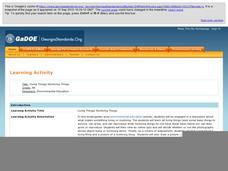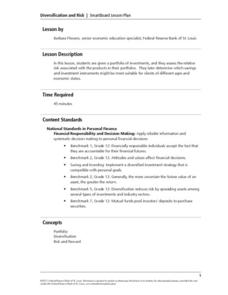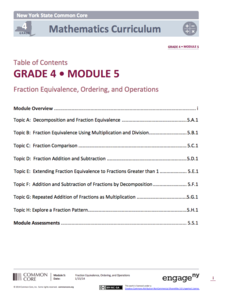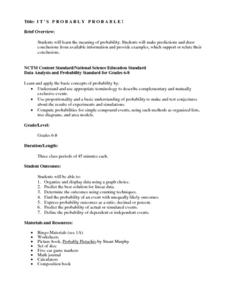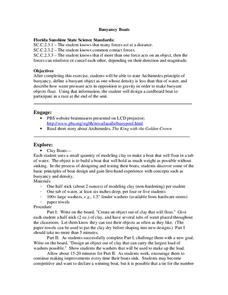Curated OER
Engaging Young Scientists with Inquiry: Part One
Building inquiry into your science lessons will make science concepts more concrete for your class.
Curated OER
Bring Your Lessons to Life with Videos
Take advantage of pupils' fascination with exciting, visual presentations by using movie clips to demonstrate key concepts.
Curated OER
Making the Classroom Desk a Trading Desk
Create a stock market simulation to motivate pupils and make economic concepts meaningful.
Curated OER
Writing a Topic Sentence
Here is an inventive, and easy-to-implement lesson on the writing of topic sentences. Learners review what a topic sentence is, practice identifying topic sentences in an informational article, then play a really cool game. All of the...
Georgia Department of Education
Living Things/ Nonliving Things
How can you tell if something is living or nonliving? Introduce a set of criteria which can be used to determine which things are alive and which are not. The class discusses the basic needs of all living organisms, checks out an...
Illustrative Mathematics
Price per Pound and Pounds per Dollar
Help learners understand the concept of unit rate as it is applied to buying beans at a grocery store. The objective is to determine the unit rate in two ways, and then apply each ratio to an additional problem. The attached commentary...
Howard Hughes Medical Institute
The Making of the Fittest: The Birth and Death of Genes
Adaptations must be made as environments change. This fabulous presentation features Icelandic icefish, a transparent, scaleless specimen that even has colorless blood. Genetics and adaptations concepts are explored as scientists study...
Federal Reserve Bank
Gini in a Bottle: Some Facts on Income Inequality
Delve into the hard numbers and fundamental concept of income inequality in the United States, using graphs, detailed reading materials, and an organized learning exercise.
Federal Reserve Bank
Diversification and Risk
After being given a portfolio of investments, your young economists will learn how to assess the relative risk of the portfolio's products and understand the importance of diversification, relating these economic concepts to real-life...
EngageNY
Fraction Equivalence, Ordering, and Operations
Need a unit to teach fractions to fourth graders? Look no further than this well-developed and thorough set of lessons that takes teachers through all steps of planning, implementing, and assessing their lessons. Divided into eight...
Visa
Financial Forces: Understanding Taxes and Inflation
Take the opportunity to offer your young adults some important financial wisdom on the way taxes and inflation will affect their lives in the future. Through discussion and review of different real-world scenarios provided in this...
Federal Reserve Bank
Creditors’ Criteria and Borrowers’ Rights and Responsibilities
Discover what criteria creditors use for making loans (the 3 Cs of Credit), and impress upon your young adults the rights and responsibilities related to using credit. Pupils role play as individuals seeking or providing credit, as well...
National Security Agency
It's Probably Probable
Learners make predictions and draw conclusions from given information as they learn the meaning of probability in this vocabulary-rich, integrated activity that presents a variety of teaching strategies to motivate and reach all learning...
West Contra Costa Unified School District
Fractional Exponents
Wow! Here is a handout packed full of tips and worked-out solutions to supplement instruction on fractional exponents. The lesson introduces and thoroughly explains the Algebra II concept, and closes with a variety of example problems,...
Center for Precollegiate Education and Training
Buoyancy Boats
What did the sea say to the boat? Nothing, it just waved. An inquiry-based lesson starts with a simple concept on the Archimedes Principle and challenges pupils to make something out of clay that floats. Then, they design an object out...
Rochester Institute of Technology
Molecules and Fuel Cell Technology
A fuel cell is where the jailer keeps gas guzzlers. Scholars review chemical reactions, chemical bonds, and chemical structure in order to apply these concepts. Participants construct fuel cell kits, using electrolysis to run the car and...
American Chemical Society
Changing State: Condensation
When you have a cold drink and you notice the water forming on the outside, it is literally pulling the water from the surrounding air to form the condensation. After watching a demonstration of condensation forming on a glass,...
American Chemical Society
Density of Water
We know solids have a density we can measure, but what about liquids? Lesson explores this concept and allows scholars to explore the relationship between volume and density. Graphing and analysis questions round out the activity.
American Chemical Society
Forming a Precipitate
Can you mix two liquids to make a solid that is insoluble? Yes, you can, and pupils see this as the lesson uses more than one combination of liquids to form a solid. Through two teacher demonstrations and a hands-on activity, scholars...
Allen & Unwin Book Publishers
In the Skin of a Monster
Kathryn Barker's In the Skin of A Monster explores how a school massacre impacts a community. Unfortunately, the events depicted are all too familiar to many. This teacher's guide for Barker's novel offers activities that enable readers...
Charanga
Sing!
Whether new to the Kodály Method of music instruction or an experienced veteran, you'll find much to make your heart sing in a teacher guide that was designed for a music appreciation project.
NASA
Food For Thought
Science can be quite tasty. A delectable unit from NASA shows learners why it's important to consider food, nutrition, and health in space. Four lessons explore the idea in great depth, including testing cookie recipes. Along the way,...
Core Knowledge Foundation
Third Grade Skills Unit 1: Classic Tales
A unit focusing on third-grade skills explores spelling patterns, conducts a read-aloud, practices reading comprehension, and administers assessments for baseline information.
Curated OER
Getting Students to Understand Why Learning Mathematical Concepts is Important
You can give a fresh response to that perennial question "when will we ever use this, anyway."






